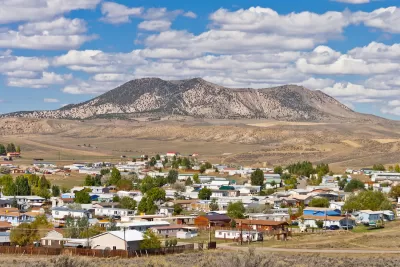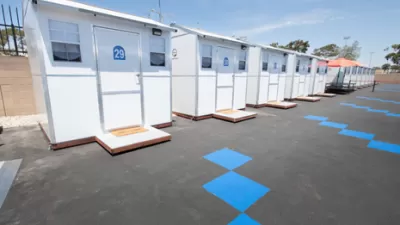Cities are incentivizing more affordable housing types and limiting permits for short-term rentals in an effort to keep housing affordable for residents.

The modular housing industry continues to grow as the housing crisis forces creative solutions that combine safety and comfort with cost-effectiveness.
In an article for Reasons to be Cheerful, Corey Buhay writes that the idea isn’t entirely new. “In the 1970s, the federal government dumped millions of dollars in subsidies into modular home factories across the US. But the subsidies couldn’t change the fact that the technology wasn’t good enough to make or move the homes efficiently.” Prefabricated homes also faced the stigma attached to ‘mobile homes’ and low-income residents.
Today, prefabricated homes can fit neatly into neighborhoods. In Colorado, locally produced prefab homes are starting to fill a growing housing gap. The Colorado manufacturer, Fading West, says it can produce a home at a cost 20 percent less than traditional housing. “The city of Boulder, Colorado, is in the middle of building a 31,375-square-foot modular housing factory that will produce manufactured homes for local residents starting in late 2024. Aurora, Colorado, also passed a resolution earlier this year to increase its use of modular housing.”
Other ways Colorado cities are addressing the housing crisis include limiting short-term rentals, controlling water rights based on affordable housing production, and creating community land trusts and affordable housing subsidies.
FULL STORY: Are Sleek Modular Homes the Future of Affordable Housing?

Study: Maui’s Plan to Convert Vacation Rentals to Long-Term Housing Could Cause Nearly $1 Billion Economic Loss
The plan would reduce visitor accommodation by 25,% resulting in 1,900 jobs lost.

North Texas Transit Leaders Tout Benefits of TOD for Growing Region
At a summit focused on transit-oriented development, policymakers discussed how North Texas’ expanded light rail system can serve as a tool for economic growth.

Using Old Oil and Gas Wells for Green Energy Storage
Penn State researchers have found that repurposing abandoned oil and gas wells for geothermal-assisted compressed-air energy storage can boost efficiency, reduce environmental risks, and support clean energy and job transitions.

Private Donations Propel Early Restoration of Palisades Playground
Los Angeles has secured over $1.3 million in private funding to restore the Pacific Palisades playground months ahead of schedule, creating a modern, accessible space that supports community healing after recent wildfires.

From Blight to Benefit: Early Results From California’s Equitable Cleanup Program
The Equitable Community Revitalization Grant (ECRG) program is reshaping brownfield redevelopment by prioritizing projects in low-income and environmental justice communities, emphasizing equity, transparency, and community benefits.

Planting Relief: Tackling Las Vegas Heat One Tree at a Time
Nevada Plants, a Las Vegas-based nonprofit, is combating the city’s extreme urban heat by giving away trees to residents in underserved neighborhoods, promoting shade, sustainability, and community health.
Urban Design for Planners 1: Software Tools
This six-course series explores essential urban design concepts using open source software and equips planners with the tools they need to participate fully in the urban design process.
Planning for Universal Design
Learn the tools for implementing Universal Design in planning regulations.
Ascent Environmental
Borough of Carlisle
Institute for Housing and Urban Development Studies (IHS)
City of Grandview
Harvard GSD Executive Education
Toledo-Lucas County Plan Commissions
Salt Lake City
NYU Wagner Graduate School of Public Service





























